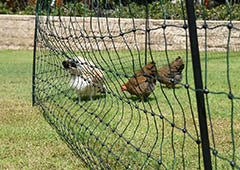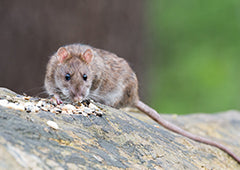Keeping your chicken coop safe from prowling predators is a top concern for all chicken keepers. Whether you live in an urban, suburban or rural area, predators like foxes and snakes pose a threat to your chicken coop, day and night. But don’t fret, caring keepers! There are many ways to prevent these fiendish foes from attacking your fabulous flock. Take a peck at our ultimate guide to predator prevention for your chicken coop and keep those hens happy, healthy and stress free. Read on to find out what types of chicken coop predators you may come across in your area and ways to prevent them from hurting your hens.

Chicken Coop Predators in Australia
Foxes Foxes are becoming more and more of an issue for Australian chicken keepers. This introduced nasty has no native predators and is now pervasive across all of mainland Australia. Whether you live in a rural, suburban or urban area, foxes can pose a threat to your precious flock of chooks.
Snakes Most species of snakes, from carpet pythons to king browns, are attracted to your chicken coop by two things - vermin and eggs. Snakes will rarely eat a chicken but a hungry predator should not be underestimated. In order to keep these slithering threats at bay you need to cut off their supply of tasty eggs and vermin treats.
Goannas Just like their sneaky snake cousins, goannas and monitor lizards are after your bum nuts and the rats, mice and vermin your unsecure chicken feed can attract. Just like with snakes, cutting off their supply of eggs and vermin will keep these tricky reptiles away.

Vermin - rats and mice Rats are a double whammy when it comes to chicken coop predators. Not only will they happily chow down on any eggs or unsecure feed they can get their claws on, they also attract the big boys looking for a vermin snack like goannas, monitor lizards and snakes.
Quolls and Tasmanian devils The Australian quoll is a rare but serious predator threat to your chicken coop. There are 4 known species of quolls active in Australia - northern quoll, spotted tail quoll, western quoll and eastern quoll. Tasmanian devils are exclusively found in - you guessed it - Tasmania. Quolls and Tasmanian devils are endangered, so if you spot one in your neighbourhood be sure to contact your local or state wildlife preservation society. Quolls and Tassie Devils are versatile nocturnal predators and can attack your bantam chickens and baby chicks as well as your eggs and any vermin hanging about the chicken coop.
Hawks, falcons and other birds of prey Hawks, falcons and other birds of prey are expert aerial hunters and most species are protected in Australia. They will often be found circling above any potential meal waiting for the right opportunity to swoop in.

Neighbourhood/stray dogs When Rover comes on over to your place he may not always be the happy neighbourhood dog he is towards your family. Chickens can trigger a hunting instinct in dogs that have not been desensitised to your flock.
Neighbourhood/feral cats
Whether it’s Fluffy the neighbourhood moggy or a feral feline on the prowl, cats who have not made your flock their family pose a serious threat to your chicken coop. Not only do they delight in chasing any vermin found in and near the coop, they can also attack your bantam hens and baby chicks.

Chicken Coop Predator Prevention Methods
Chicken coop predators are drawn to your chicken coop for one (or more) of these four reasons:
- Easy access to your chickens
- Easy access to your eggs
- Easy access to vermin
- Easy access to chicken feed
Let’s have a stickybeak at ways you can cut off their easy access and keep your hens healthy and happy.
1 Flock guardian dog Dogs make great coop companions and there are certain breeds, like Maremmas or Great Pyrenees dogs, who will protect your hens with pride. But even your family dog makes an egg-cellent poultry protector for your chicken coop. Have a peck at our guide to training your dogs to live with your hens here.

2 Burrowing prevention Make sure your coop is burrow proof with a mesh floor that juts out at least 30cm from the coop perimeter or is attached at the base of the chicken coop or run. Alternatively you can make sure your coop has a strong foundation of concrete, bricks, pavers or timber sleepers to stop predators like foxes, snakes, goannas, vermin, quolls and neighbourhood animals from disturbing your poultry peace.
3 Strong gauge, small space mesh on all chicken coop entry points All entry points on your coop should be protected by strong gauge galvanised mesh that is no larger than 10mm x 10mm. This includes ventilation points like windows and the wire used for your chicken run. This will help prevent predators from attacking your chooks in their coop and snakes or vermin from gaining entry to your chicken run.
4 Electric fencing The ultimate in backyard chook protection, electric poultry fencing will keep predators away by delivering a small shock, so they associate your chickens with an unpleasant sensation. Perfect for serious free rangers and those with highly active foxes, dogs and feral cats in their area, electric poultry fencing is easy to set up and offsets its cost by allowing your hens to forage safely - reducing costs in feed and flock replacement. It also acts as an additional night time barrier to deter nocturnal predators like quolls and feral cats.

5 Sensor lights and fox lights Nocturnal predators hunt after dark to avoid humans and competition for prey. They like to remain undetected and will be spooked by any indication that they have been caught in the act. Strategically placing sensor lights on your coop and chicken run will help scare off any potential beasts with a shock of bright light. You can also invest in fox deterrent light systems that mimic animal eyes in the dark. This will keep Mr Fox from encroaching on what it thinks is another predator’s territory.
6 Lockable nesting boxes Egg hunters like snakes, goannas, rats and quolls need to be denied access to your ladies laying boxes. Secure nesting boxes mean that any potential bum nut bandits will come away empty mouthed. Make sure your coop has lockable or secure nesting boxes that are only accessible by a human hand. This method of course will not work for light fingered neighbours.
7 Secure chicken feed Secure feed means no vermin and no vermin means no nasty so-and-so's hanging about your chicken coop for an easy rat or mouse meal. An automatic chicken feeder is the best way to reduce the feed spillage that attracts rats and mice. Making sure your stored feed is kept in a secure drum and removing food sources from the coop or chook run at night is another way to prevent vermin and consequently predators from sniffing around.

8 Pest and vermin repellent plants Most people are aware that certain plants repel insects, but not many keepers know that vermin are adverse to some plants too! Planting mint, lemon balm, catnip and lavender around your coop will help deter pests, rats and mice. You can take it a step further and hang bunches of these fresh smelling herbs from your chicken run roof.
9 Keep a rooster The natural purpose of the rooster in a flock (aside from helping hens make adorable baby chicks) is to protect their ladies from threats. The safety of his hen harem is a rooster's number one priority. Having a rooster in your flock (if your area allows for it) will ensure your girls are warned of any incoming predator threat and can make their way to safety.
10 Scare owls and scare tape Birds of prey such as raptors, ravens, butcher birds and magpies are naturally wary of owls. Having a scare owl positioned on your coop or run will help deter these predators, just make sure you move its position every few days so predators don't realise they're dealing with a dummy. Scare tape is a holographic tape that confuses birds of prey by reflecting light haphazardly. You can get a similar effect by hanging old CDs near your run.

11 Chicken run A large and securely meshed chicken run not only protects your flock from aerial predators, but also gives them much needed safe foraging space outside of the coop. Make sure your chook run mesh is galvanised, a strong gauge and at least 10mm x 10mm to keep your hens as safe as possible. Adding a mesh flooring or a perimeter foundation of concrete, bricks, pavers or timber sleepers will help prevent burrowing nasties from ruining the poultry party.
12 Secure backyard fencing Neighbourhood or stray cats and dogs can be deterred by making sure your backyard fencing is secure and high. Cats are notorious acrobatic climbers so make sure your fence is feral cat proof with a rolling bar system or spike wire top.
13 Out of the box solutions Over the years we have heard of and tried many different unconventional chicken coop predator prevention methods. For foxes - try leaving a battery operated radio tuned to a talk-back station near your coop overnight. Visiting vixens will think that humans are nearby and steer clear. A worn (um, smelly) men's shirt hung near the chicken run is thought to deter predators. The smell of a human nearby is a big turn off for predators in general.
As you can see, there many threats to your coop and many ways to help protect your flock. If it all seems a little overwhelming just remember the top 3 ways to keep your chooks safe:
- Make sure your chicken coop and run is burrow proof and your hens are securely inside at night
- Keep your chicken feed secure with a treadle feeder and store it securely at night
- Establish a chicken area perimeter with electric fencing to deter larger predators
A big fear for many chicken keepers is keeping their flock safe from predators. No one wants to spend their time guarding a coop from intruders.
If you're in need of the best advice and information to keep your flock safe, it's your clucky day! Our friends at Chickenpedia have created a fantastic Poultry Predator Protection course. Sleep soundly knowing your chickens are safe from predators. Discover ways to keep intruders out of your coop, learn how to identify predators, and become the ultimate security eggspert.
Protect your flock today- check out Chickenpedia and their brilliant courses. I highly recommend their beginner-friendly, well-structured courses to all my readers!
We design all our coops and accessories with predator and vermin protection in mind. Have a look at our coop range here and our accessories here.

















